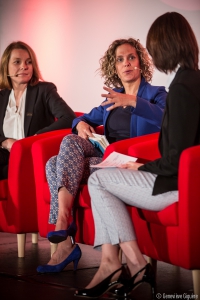How to Be a Better Leader
Be Bold
Ève Laurier, a 2011 EMBA McGill-HEC Montréal alumna and General Manager at Edelman, shared her thoughts on audacity.
What is Audacity?
For Eve, audacity is daring to take action despite a feeling of vertigo, despite the fear. She believes that not taking decisions and avoiding action is usually much worse, so when she gets that feeling of vertigo, she reminds herself that she “will not die” and she moves forward. She explained that undertaking the EMBA McGill-HEC Montréal program was among the boldest decisions she’s made. The decision to leave the large firm where she held a senior position, a few months after having her first child, to start her own business, is an example of her approach to taking action despite the fear.
Eve draws a line between personal boldness and the audacity of the Manager.
Intuition and Action
On a personal level, Eve finds she relies heavily on intuition. When she has decided against making a bold move, and later regretted it, she feels it was because she did not listen to her inner voice, and instead focused too much on the input of people she asked for advice. She has learned from this, and no longer asks people what they think of her decisions, but rather how they can help her implement them.
Establish a “Culture of Audacity”
In her management role, Eve recognizes it takes time to properly install changes. She starts by explaining that rationale behind her bold decisions and thereafter focuses on helping people move forward into action. Because daring decisions often encounter some resistance, Ève looks for allies to help her get others on board. And she works to develop a “culture of audacity” in the organization. She wants her employees to understand that it is acceptable to take bold decisions, that failure is allowed (if errors are documented to avoid repeating them) and that there is a difference between audacity and ego; the bold decisions must serve the organization and not one person. To establish this culture, trust is of vital importance. If employees have confidence, they will lower their barriers to change. As a manager, she thinks that she has to deliver the key messages to build trust, and then she relies on her allies, her ambassadors of change, to influence their colleagues.




